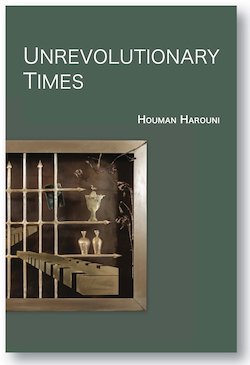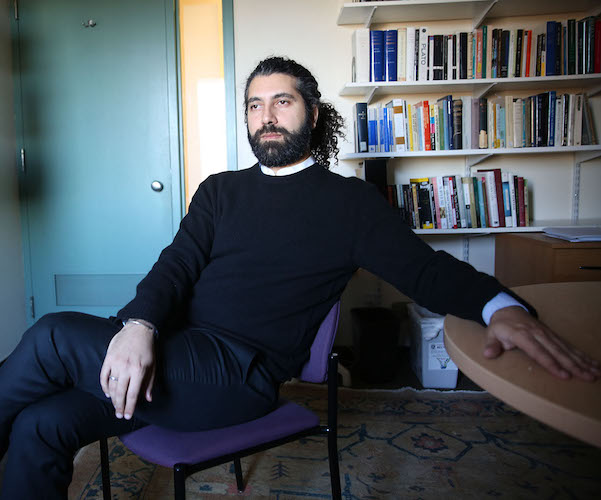Poetry Review: “Unrevolutionary Times” — Try Men’s Souls?
By James Kates
In his poetry, Houman Harouni has peopled a world with voices that are well worth listening to.
Unrevolutionary Times by Houman Harouni. Arrowsmith Press, 98 pages, $20.
 One after another they address the reader, the figures (as he calls them) in Houman Harouni’s Unrevolutionary Times, like the dead in Edgar Lee Masters’s Spoon River Anthology. But unlike Masters’s vivid individuals confined in death as in their lives to a single small town, these two dozen figures, who are introduced to us as types — “The Worker,” “The Traveler,” “The Hostess,” “The Seducer,” rather than by name — inhabit a far wider world, one constrained not by the irony of geography (although western Asia is indicated by eclectic cultural reference) but by their place in Harouni’s own understanding of our times.
One after another they address the reader, the figures (as he calls them) in Houman Harouni’s Unrevolutionary Times, like the dead in Edgar Lee Masters’s Spoon River Anthology. But unlike Masters’s vivid individuals confined in death as in their lives to a single small town, these two dozen figures, who are introduced to us as types — “The Worker,” “The Traveler,” “The Hostess,” “The Seducer,” rather than by name — inhabit a far wider world, one constrained not by the irony of geography (although western Asia is indicated by eclectic cultural reference) but by their place in Harouni’s own understanding of our times.
Just as Masters began his collection with a table-setting poem, “The Hill,” so Harouni begins with his own introduction, “If It’s Revolution:”
Look! Over there! The stars! Speak the stars!
You are the only one who can!
But what are we to make of the last words in this poem?
Anyway
it doesn’t have to be like this you know in this very order
But if it’s not then it’s not
what I call revolution
How do we read “But if it’s not then it’s not? ” The reader vacillates between a negative iteration of the currently fashionable dismissal “It is what it is” followed by a positive assertion that sets revolution as a more positive response to the condition posed by poem’s title: “then it’s not what I call revolution.”
Like Masters’s, Harouni’s first-person voices sometimes exhort the reader:
In the name of what rises from the mud
what cannot die but is destined to bleed
Go on! Begin to write
your name on the sea
Or express their intimacy:
Well, it’s time, my sweet brother.
I hear you are cold. If only
I were firewood, I would flare hotter
than rage in a poor father. If only.
For most of the book, these poems use a fluid, sometimes fragmented free verse that employ blank spaces within lines: these might be breaths, or punctuation, or significant lacunæ. Occasionally, the verses break into subtle, unheralded rhymes:
For strength tonight renders you weak
This is all: the heart wants to break
into small change but the rest
of the body holds back
Whatever you keep you keep as a lack
And joy piles on joy only as stress
In three places in his notes Harouni felt he had to point out that the poems offer variations on the formal ghazal associated with Arabic and other Asian verse.

Poet and Harvard University lecturer Houman Harouni. Photo: Jill Anderson
Nearer the end, Harouni brings in a set of first- and third-person surrealistic prose parables, still numbered among the “figures in unrevolutionary times. ” A couple of these, “The Sage” and “The Master,” read like gentle parodies of Kahlil Gibran.
The sage was speaking to the gathering at the marketplace. His discourse was on duty, but in mid-speech something in the faces of his listeners distracted and then overwhelmed him…. “This pig is unique and there is no other pig like it. See it clearly: you will know it is no pig at all. It is a face of the One, and when it oinks, the One is singing.”
Harouni’s range of styles is nothing if not virtuoso, but for all of that, the tone of voice remains monochromatic. Different personæ are often stand-ins for a single voice, one that is not distinctively individual. As a result, I have found it best to encounter the poems one by one, with long pauses in the reading like the pauses indicated within the lines. Although the poet himself, I think, would have us read them as a coherent vision of his imagined world, like Masters’s Spoon River.
Perversely, perhaps the poems in Unrevolutionary Times I like the best are the two that make up the “Epilogue.” The first is the last of th book’s elegantly turned loose ghazals, “The Angels,” and the other an affirmative coda inviting us to attend to different angels with a fresh urgency:
If one day you put on a silver armor
and your heart seems like it can take anything,
then I will take you to Los Angeles
….
tremor of voices and sunlight from the gate:
I will take you to Los Angeles.
In these unrevolutionary times, Harouni’s poems are hardly those that try men’s souls. They will not rock your world. But the world he has peopled with these voices — that world he has figured — is well worth a visit or two.
J. Kates is a poet, feature journalist and reviewer, literary translator, and the president and co-director of Zephyr Press, a nonprofit press that focuses on contemporary works in translation from Russia, Eastern Europe, and Asia. His latest book of poetry is Places Of Permanent Shade (Accents Publishing) and his newest translation is Sixty Years Selected Poems: 1957-2017, the works of the Russian poet Mikhail Yeryomin.

